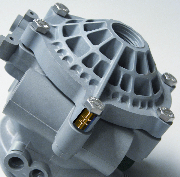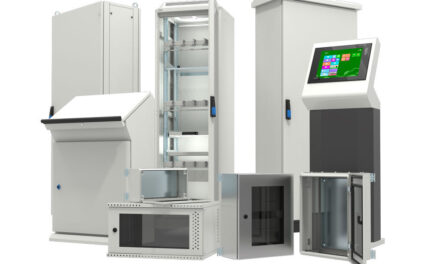 By Christie Jones, Market Development Manager, Spirol International.
By Christie Jones, Market Development Manager, Spirol International.
In applications where the mating component is also plastic, a Compression Limiter is necessary to avoid the creep or stress relaxation in the mating component from reducing the frictional load in the threaded joint.
Similar to Threaded Inserts, Compression Limiters are used to ensure bolted joint integrity in plastic assemblies. As the bolt is tightened to achieve the required friction between threads, the plastic is compressed. The Compression Limiter absorbs the force generated during tightening of the bolt, and isolates the plastic from excessive compressive loads. Without the Compression Limiter, plastic will creep resulting in the loosening and eventual failure of the joint. The Compression Limiter ensures that the joint remains intact throughout the life of the product.
In order for the Compression Limiter to work properly, it should abut the insert, so that the insert and not the plastic, carries the load. The internal diameter of the compression limiter in the mating component must be larger than the outside diameter of the assembly screw, but smaller than the pilot or face diameter of the insert to avoid “jack-out”.

Headed Inserts such as Spirol Series 16, 20, 25, 28, 30 and 51 are designed to increase the contact surface for the Compression Limiters. In addition, Series 14, 19, 24, 41 and 45 generally have adequate surface area. In any event, at the design stage proper contact needs to be evaluated.
If the pilot diameter of the Insert being used is too small for the inside diameter of the Compression Limiter, then a special Compression Limiter with reduced clearance between the assembly screw may resolve the problem. This of course also reduces permissible misalignment.

If the surface area of the insert is inadequate for proper contact with the Compression Limiter, then the only solution is using a plastic in the mating component that has good anti-creep characteristics and using a Compression Limiter with maximum wall thickness for better distribution of the load. Jack-out in these situations will be a concern and needs to be addressed with avoiding over-torquing the assembly screw.
For more information, contact Spirol Industries Ltd, Princewood Road, Corby, Northants, NN17 4ET, Tel: +44 (0) 1536 444800, Fax: +44 (0) 1536 203415, email: uksales@spirol.com or visit www.spirol.com

